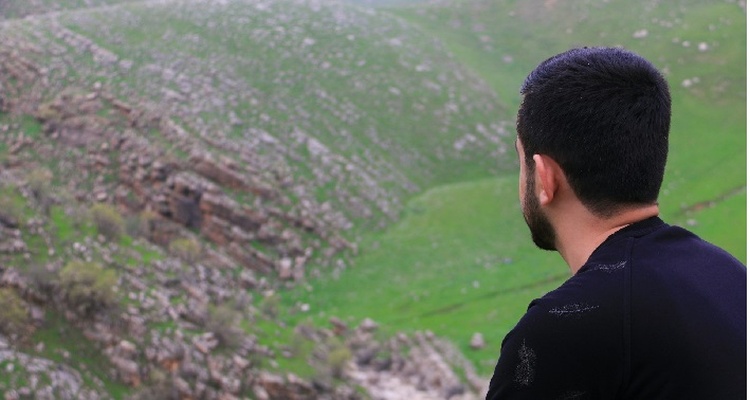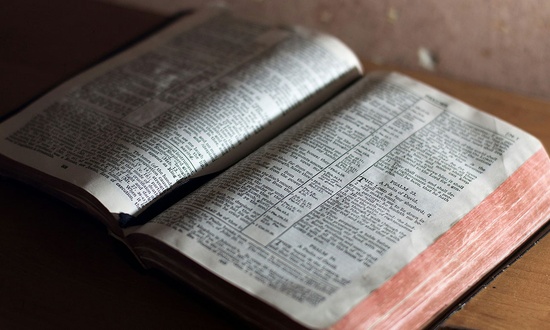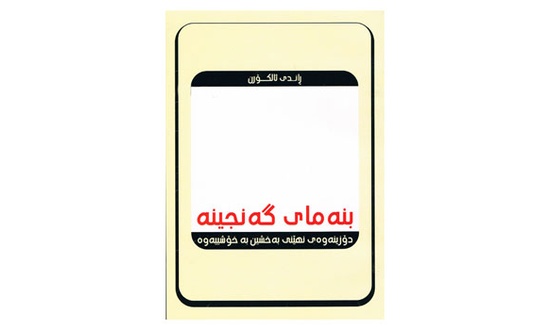نوسینی: ڕاندی ئەلکۆرن
زیاتر لە چوار ساڵ هاوسەرە خۆشەویستەکەم نانسی رووبەڕووی شێرپەنجە بووەوە، چەندین هەواڵی خۆش و چەندین هەواڵی ناخۆشمان پێدەگەیشت. ئێمە کەشتی خولاوەی هەستەکانمان لێدەخوڕی لەمیانەی سێ نەشتەرگەریەکانی و سێ قۆناغی تیشکلێدان و سێ قۆناغی چارەسەری کیمیایی.
من زۆر بەڕوونی ئەو رۆژەم لەیادە کاتێک دکتۆرەکە وتی ئێستا ئەمە قۆناغی چوارەمی شێرپەنجەیە کەوا بڵاوەی کردووە بەنێو سییەکانیدا. ئەو شەوە ئێمە بەیەکەوە نوێژمانکرد و دواتر چوومە خوارەوە و کەوتمە سەر ئەژنۆ لەلای تەختەکەوە روخسارم خستە نێو دەستەکانم و گریام. من دڵی خۆم هەڵڕشت بۆ خودا و لێیپاڕامەوە دەستوەردان بکات. من ئەوەم ئەنجامدا ١ پەترۆس ٥: ٧ داوامان لیدەکات ئەنجامی بدەین: "هەموو خەمێکتان بە خودا بسپێرن چونکە ئەو بایەختان پێدەدات" (وەرگێرانی نوێی نێودەوڵەتی).
لەناکاودا هەستم بە ئامادەییکرد لەتەنیشتمەوە. چاوەکانم کردنەوە و دەستەکانی سەگە زێڕینەکەمان بەناوی ماگی لە تەنیشت دەستەکانی منەوەن. سەیری منی کرد و نیگایەکی خەفەتبار و خۆشەویستی پێدام، فرمێسکەکانی منی دەلێستەوە و دواتر بەدەنگێکی بەرزی ماتەمینی حەپی بەجۆرێک هەرگیز پێشتر ئەوەی ئەنجام نەداوە و دواتریش ئەنجامی نەدایەوە. من تەنها دەتوانم ئەوە بە ناڵینێک پێناسە بکەم. ئەمە سەرسامیکردم.
من راستەوخۆ بیرم چووە لای رۆما ٨ ئەوەی پێمان دەڵێت، ئێمە دەناڵێنین، تەواوی دروستکراوەکان دەناڵێنن و رۆحی خودا لەبری ئێمە دەپاڕێتەوە بە ناڵاندنێکی زۆر قوڵتر لەوەی باس بکرێت. من تێگەیشتم لەوەی هەرسێکمان بەیەکەوە دەناڵێنین لەپێناوی نانسی، ئەوەی هەموومان خۆشمان دەوێت- خودای ئێمە، من و سەگەکەمان. دواتر من زیاتر گریام، ئەو جارە دڵنەواییەکی مەزنترم بەدەستهێنا لەهەردوو هاوڕێیەکانمەوە.
خودای هەموو دڵنەواییەک
دوای ساڵیک، من لەوێبووم کاتێک نانسی دواهەناسەیدا. من زۆر بەسەختی دڵتەنگبووم، بەڵام زۆر شانازی دکەم هاوسەری ئەوبووم لەگەلیدابووم هەتا مردن لەیەکتری جیاکردینەوە. ئێستا دوای دوو ساڵ لەو کاتەوەی گواستراوەتەوە بۆ ئاسمان، ونبوونی ئەو زۆر ئاشکرایە. من بەردەوام بیری نامەناردنەکانی دەکەم سەبارەت بە سەگەکەمان و تۆپی پێ و وەرگیراوە مەزنەکانی چارلس سپۆرگیۆن و جەیمس ئینیل پاکەر و کەسانیتر. من بیری نەوای دەنگی ئەو دەکەم هەروەها پێکەنینەکەی ئەوەی هەمیشەی بەدەنگێکی بەرز و کاریگەربوو.
ئازارەکە سەختبوو. بەڵام خودا کاری نیعمەتی ئەنجام دەدا لە ژیانی من، دڵنەوایی پێدەبەخشیم و رێگەیدام بەردەوامبم بەبێ ئەو. (ئەمەش بە مەزنی یارمەتیدەربوو چاوەڕوانی ئەوەی رۆژێک دووبارە لەگەلیدا دەبمەوە بە ئامادەیی مەسیح!) لە زەبوری ١٦: ٨ داود دەڵێت، "من هەمیشە خودام لەبەردەمی خۆم داناوە؛ چونکە ئەو لە دەستە راستی منە، من ناهەژێم" (وەرگێڕانی راستەوخۆ لە وەشانی نوێی نێودەوڵەتی NIV). دانانی خودا لەبەردەمی خۆت واتا تێگەیشتن لە ئامادەیی ئەو هەروەها یارمەتی بەردەوامی ئەو.
کاتێک منداڵێک لەسەر پاسکیلێک دەکەوێت، پێویستی بە باوکی نییە بڵێت، "شیرینەکەم، بۆیە ئەمە روویدا – بە لەبەرچاوگرتنی خێرایی و قورسایی پاسکیلەکە، ناتوانێت بە سەختی بسوڕێتەوە و . . ." نەخێر. منداڵەکە بەسادەییەوە پێویستی بە دڵنەواییە. ئێمە پێویستمان بە شیکردنەوەکان نییە، ئەوانەی لە زۆرینەیان تێناگەین بەهەرحاڵ. ئێمە پێویستمان بە "خودایە، ئەو کەسەی دڵنەوایی خەفەتبارەکان دەکات" (٢ کۆرنسۆس ٧: ٦؛ وەرگێڕانی راستەوخۆ لە وەشانی نوێی نێودەوڵەتی NIV). ملیۆنەها کەس، بە منیشەوە، شایەتی بۆ ئەو دڵنەواییە دەدەن خودا بەسەر ژیانی ئەوانی داهێناوە لە تاریکترین کاتەکاندا. ". . . تۆ، ئەی خودایە، یارمەتی منت داوە و دڵنەواییت کردووم" (زەبوری ٨٦: ١٧؛ وەرگێڕانی راستەوخۆ لە وەشانی نوێی نێودەوڵەتی NIV).
جۆنی ئەریکسۆن تادا و ستیڤ ئیستێس نوسیویانە لەکاتێک خودا دەگریێت
خودا، وەک باوکێک، تەنها ئامۆژگاریەکان نابەخشێت. ئەو خۆی دەبەخشێت. ئەو دەبێتە هاوسەری بێوەژنی دڵتەنگ (ئیشایا ٥٤: ٥). ئەو دەبێتە دڵنەواییکار بۆ ژنی نەزۆک (ئیشایا ٥٤: ١). ئەو دەبێتە باوکی هەتیوەکان (زەبوری ١٠: ١٤). ئەو دەبێتە زاوای کەسانی سەڵت (ئیشایا ٦٢: ٥). ئەو چارەسازی نەخۆشەکانە (دەرچوون ١٥: ٢٦). ئەو راوێژکاری سەرنجڕاکێشە بۆ کەسی دڵتەنگ و سەرلێشێواو (ئیشایا ٩: ٦).
پۆڵس دەڵێت، "خودای هەموو دڵنەواییەک . . . دڵنەواییمان دەکات لەهەموو تەنگانەیەکماندا، تاکو بتوانین دڵنەوایی ئەو کەسانە بکەین لەهەر تەنگانەیەکدان، بەو دڵنەواییەوەی خۆمان پێی دڵنەواییکراین لەلایەن خوداوە" (٢ کۆرنسۆس ١: ٣-٤؛ وەرگێڕانی راستەوخۆ لە وەشانی نوێی نێودەوڵەتی NIV). زۆربەی جار کاتێک دڵتەنگین، ئێمە تەنها بیر لە وەرگرتنی دڵنەوایی دەکەینەوە، نەوەک لە بەخشینی دڵنەوایی. هەندێک کاتی دڵتەنگی هەن تێیدا تەنها وەرگرتنی دڵنەوایی پێویستە ببێتە تاکە سەرنجی ئێمە. بەڵام کاتێک خودا دڵنەواییمان دەکات، ئێمەش دەتوانین هەمان ئەم دڵنەواییە بەکاربێنین بۆ سەبوری کەسانیتر.
کاتێک خودا دڵنەوایی خۆی دەپڕژێنێت بەسەرماندا راستەوخۆ لەڕیگەی خزمەتی رۆحی پیرۆزی خۆیەوە، خودا هەروەها کەسانیتر بەکاردێنێت بۆ دڵنەوایی ئێمە. من ئەزمونی ئەمەم کردووە لەڕیگەی هاوڕێکان و ئەندامانی خێزانەکەم. بەختەوەرییەکی مەزن هەیە لەهەردووکیان ، بەخشین و وەرگرتنی دڵنەوایی لە خێزانی خودا. ئەمەش ئاسودەییە ببینە ئامرازەکانی ئەو، هەروەها ئەمەش سەرچاوەی دڵنەواییە.
هاوڕێیەتی مەسیح
مەسیح دەڵێت، "چیتر بە خزمەتکارەکان بانگتان ناکەم . . . بەڵکو من بە هاوڕێکان بانگتان دەکەم" (یوحەنا ١٥:١٥؛ وەرگێڕانی راستەوخۆ لە وەشانی نوێی نێودەوڵەتی NIV). ئەم راستیە سەرسامە بووە دڵنەواییەکی رۆژانەی قوڵ بۆ من. لەو کاتەوەی مەسیحم ناسیوە وەک گەنجێک، من هاوڕێیەتیم هەیە لەگەل ئەو؛ بەڵام بەڕاستی ئەوە بە ماڵەکەمی داکێشا کاتێک دووەم باشترین هاوڕێم، نانسی، چیتر لێرە نییە لەپێناوی من. لەکاتێکدا هاوڕێکانیتر یارمەتیان داوم، هیچ شتێک لەهاوڕێیەتی مەسیح مانادارترنییە بەلای منەوە. ئێستا بەم چەشنەیە. هەموو رۆژێک.
من هەرگیز هێندەی ئێسا لە مەسیح نزیک نەبوومە. بەخۆم دەڵێم نانسی ئێستا لەگەل من و باشترین هاوڕێی خۆی دەژیت. هەروەها من ئەزمونی ئەوە دەکەم و هەست بە ئامادەیی مەسیح دەکەم لەهەموو رۆژێکدا. لەکاتی مردنی نانسی هیچ یەکێکمان باشترین هاوڕێی خۆمان لەدەست نەدا. ئەو هێشتا لەگەل هەردووکمانە، هەرچەندە ئێمە هێشتا یەکمان نەگرتۆتەوە.
ئەوەی مەسیح بەڕاستی هاوڕێی ئێمەیە و خوازیارە هاوڕێمان بێت چەمکێکی شۆڕشگێڕانەیە بەلای زۆرینەی مەسیحیەکانەوە. راستە ئێمە هەرگیز ناتوانین نکۆڵی بکەین یان ئەو راستیە بشارینەوە کەوا ئێمە خزمەتکارەکانی خوداین، هەروەها ئەمەش لەخۆیدا بانگەوازێکی بەرزە. بەڵام لەهەمان کاتدا پێویستە ئەو راستیە سەرسوڕهێنەرە دووپات بکەینەوە ئێمە منداڵەکان و هاوڕێکانی ئەوین. خودا دەتوانێت خزمەتکارەکانی خۆشبوێت و خۆشی دەوێن، بەڵام ئەو بەدڵنیاییەوە بەهەموو دڵیەوە منداڵەکان و هاوڕێکانی خۆشدەوێن و خوازیارە باشترین شت بۆ ئیێمە ئەنجام بدات تەنانەت کاتێک ئەو باشترینە شێوەیەکی جیاواز وەرگرێت لەوەی ئێمە رەنگە هەڵمانبژاردووە.
دوایت لیمان موودی دەڵێت، "یاسایەک من ساڵانێکە پەیڕەوی دەکەم بریتیە لە مامەڵەکردن لەگەل مەسیحی خاونشکۆ وەک هاوڕێیەکی کەسی. ئەو تەنها شێوەباوەڕ نییە، یان شێوەباوەڕیکی سادە، بەڵکو ئەو خۆیەتی ئێمە هەمانە."
کاتێک دڵتەنگ دەبین، ئێمە ئەو دڵتەنگیە وەک هاوڕێیەک دەبینین؛ بەڵام هاوڕێی مەزنتر و نزیکتری ئێمە مەسیحە. ئەو دەڵێت، "من هەرگیز بەجێت ناهێڵم و وازت لێناهێنم" (عیبرانیەکان ١٣: ٥؛ وەرگێڕانی راستەوخۆ لە وەشانی نوێی نێودەوڵەتی NIV). مەسیح رێنماییکار و هاوڕێی ئێمەیە، هەروەها رزگارکار و خاوەنشکۆی ئێمەیە. پەیوەندیمان لەگەل ئەو گەشە دەکات کاتێک ئێمە کات لەگەل ئەودا بەسەر دەبەین – قسەی لەگەل دەکەین و گوێی لێدەگرین. وەک ئەوەی ئۆسواڵد چەمبەر نوسیویەتی، "ئازیزترین هاوڕێ لەسەر زەوی سێبەرێکی سادەیە بە بەراورد بە مسیح."
ئێمە روخساری ئەو دەبینین
ئازارچەشتن و گریان ڕاستەقینە و قووڵن، بەڵام بۆ منداڵانی خودا ئەوانە کاتین. ڕۆژێک خەم کۆتایی دێت. بۆ هەمیشه. خۆشی هەتاهەتایی بەڕێوەیە. مەسیح، هاوڕێی هەتاهەتاییمان،"هەموو فرمێسکێک لە چاویان دەسڕێتەوە، ئیتر مردن نابێت، نە شیوەن، نە گریان و نە ئازار" (ئاشکراکردن ٤:۲۱؛ وەرگێڕانی راستەوخۆ لە وەشانی نوێی نێودەوڵەتی NIV). ئەمە بەڵێنی بەخوێن-كڕاوەی مەسیحە.
لەم میانەیەدا کاتێک دڵمان بە ئازارە، با بگەڕێینەوە لای مەسیح، مەزنترین سەرچاوەی دڵنەوایی و ئاشتی ئێمە. "ئەمە دڵنەوایی منە لەکاتی تەنگانەمدا، بەڵینی تۆ ژیانم پێدەبەخشێت" (زەبوری ١١٩: ٥٠؛ وەرگێڕانی راستەوخۆ لە وەشانی نوێی نێودەوڵەتی NIV).
The Comfort and Friendship of Jesus in Our Grief
Over the four-plus years my beloved wife Nanci faced cancer, there were many good reports and many bad ones. We rode a roller coaster of emotions throughout her three surgeries, three rounds of radiation, and three rounds of chemo.
I vividly remember the day when the doctor said it was now stage-four cancer that had spread to her lungs. That night we prayed together, and then I went downstairs, got on my knees by the couch, buried my face in my hands, and wept. I poured out my heart to God, begging Him to intervene. I did what 1 Peter 5:7 tells us to do: “Cast all your anxiety on him because he cares for you” (NIV).
Suddenly I felt a presence beside me. I opened my eyes and saw our Golden Retriever Maggie’s front paws next to my hands. She gave me a look of loving concern, licked my tears, and then made a loud mournful sound she had never made before and never did after. I can only describe it as a groan. It startled me.
I thought immediately of Romans 8 which tells us that we groan, the whole creation groans, and God’s Spirit intercedes for us with groanings too deep for words. I realized that three of us were groaning together for Nanci, who we all loved—our God, myself, and our dog. And then I wept more, this time finding great comfort in both my companions.
The God of All Comfort
A year later, I was there when Nanci took her last breath. I felt profoundly sad, yet so privileged to have been her husband and to be there till death did us part. In the over two years now since she relocated to Heaven, her absence has been palpable. I miss her frequent texts about dogs and football and great quotes from Charles Spurgeon and J. I. Packer and others. I miss the sound of her voice and her laughter, always so loud and contagious.
The grief has been difficult. Yet God has been doing a work of grace in my life, bringing me comfort that allows me to go forward without her. (This is greatly helped by the anticipation of one day being with her again in the presence of Jesus!) In Psalm 16:8 David says, “I have set the LORD always before me; because he is at my right hand, I shall not be shaken.” To set God before me is to recognize His presence and constant help.
When a child falls off a bike, she doesn’t need her father to say, “Sweetheart, here’s why it happened—given your speed and the weight of this bike, it couldn’t tolerate that sharp turn and…” No. The child simply wants comfort. We don’t need explanations, most of which we wouldn’t understand anyway. We need “God, who comforts the downcast” (2 Corinthians 7:6). Millions of people, including me, attest to the comfort He has brought them in their darkest hours. “…you, LORD, have helped me and comforted me” (Psalm 86:17).
Joni Eareckson Tada and Steve Estes write in When God Weeps,
God, like a father, doesn’t just give advice. He gives himself. He becomes the husband to the grieving widow (Isaiah 54:5). He becomes the comforter to the barren woman (Isaiah 54:1). He becomes the father of the orphaned (Psalm 10:14). He becomes the bridegroom to the single person (Isaiah 62:5). He is the healer to the sick (Exodus 15:26). He is the wonderful counselor to the confused and depressed (Isaiah 9:6).
Paul says, “[The] God of all comfort... comforts us in all our affliction, so that we may be able to comfort those who are in any affliction, with the comfort with which we ourselves are comforted by God” (2 Corinthians 1:3–4). Often when we are grieving, we think only of receiving comfort, not giving it. There are times in grief when receiving needs to be our sole focus. But when God comforts us, we are enabled to also use that same comfort to console others.
While He pours out His comfort to us directly by a ministry of His Holy Spirit, God is also fond of using other people to comfort us. I have experienced this through my friends and family members. There is great pleasure in both giving and receiving comfort in God’s family. It’s fulfilling to be His instrument, and that’s a source of comfort as well.
The Friendship of Jesus
Jesus says, “No longer do I call you servants…but I have called you friends” (John 15:15). This stunning truth has become a deep daily comfort to me. Ever since I came to know Jesus as a teenager, I’ve had a friendship with Him; but it really hit home when my second best friend, Nanci, was no longer here for me. While other friendships have helped, nothing has meant more to me than the friendship of Jesus. It still does. Every day.
I have never felt closer to Him than I do now. I tell myself that Nanci now lives with her best friend and mine. And I am experiencing and sensing His presence with me every day. At her death, neither of us lost our best friend. He is still with both of us, even though we are not yet reunited.
That Jesus truly is and wants to be our friend is a revolutionary concept to many Christians. True, we should never deny or minimize the fact that we are God’s servants, and that itself is a high calling. But we should simultaneously affirm the wondrous fact that we are His children and friends. God can and does love His servants, but He certainly loves wholeheartedly His children and His friends. And He intends to do His best for us, even when that best takes a different form than we might have chosen.
Dwight L. Moody said, “A rule I have had for years is to treat the Lord Jesus Christ as a personal friend. His is not a creed, a mere doctrine, but it is He Himself we have.”
As we grieve, we find that grief itself is a companion; but our greater companion and closest friend is Jesus. He has said, “I will never leave you nor forsake you” (Hebrews 13:5). Jesus is our mentor and best friend, as well as Savior and Lord. Our relationship with Him grows as we spend time with Him—talking and listening to Him. As Oswald Chambers wrote, “The dearest friend on earth is a mere shadow compared to Jesus Christ.”
We Will Behold His Face
Suffering and weeping are real and profound, but for God’s children, they are temporary. One day, grief will end. Forever. Eternal joy is on its way. Jesus, our forever friend, “will wipe away every tear from their eyes, and death shall be no more, neither shall there be mourning, nor crying, nor pain.” This is the blood-bought promise of Jesus.
In the meantime, when our hearts ache, let’s turn to Jesus, our greatest source of comfort and peace. “This is my comfort in my affliction, that your promise gives me life” (Psalm 119:50).
Photo: Unsplash



